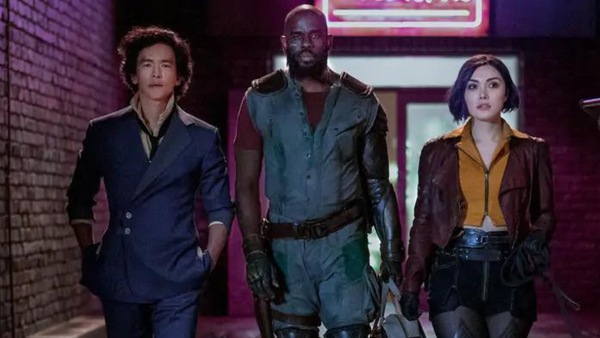The Cowboy Bebop Live-Action Is As Artless As The Anime Was Iconic

- Akshay Menon
Film Companion
Last Updated: 01.11 AM, Jun 19, 2022
Music was a big part of the original Cowboy Bebop anime. The animated fights flowed with slick rhythm, the dialogues dropped with poetic impact and the emotional tones and undertones were carried by lilting jazz and blues. Each episode was structured as a session, one performer following the other, treating viewers to a rich medley that literally and thematically explored the vibrant, quirky characters and the messy, neo-noir galaxy they lived in. In comparison, Netflix’s live-action adaptation drops with all the art and delicacy of an off-key note, played by tripping and falling headfirst onto a piano.
Anime fans, after several botched remakes, have reached a point where they’re conditioned to shudder at the very concept of adaptations. Purists (and trolls) have long cautioned against attempting to translate the suspension of disbelief and limitless imagination that characterises anime, to the limitations of live-action cinema. To complicate matters further, live-action remakes have the added burden of justifying their existence when their originals are still relevant and celebrated. How do they add value while treading the tightrope between staying faithful to the original and creating something novel?
Netflix’s latest live-action answers it by regurgitating the anime’s plot with a few small differences and none of its depth. Spike Spiegel (John Cho), Jet Black (Mustafa Shakir) and Faye Valentine (Daniella Pineda) work as bounty hunters, known in this galaxy as cowboys, chasing criminals in their rust-bucket spaceship, the Bebop, and cashing in on their bounties. The show tries to pass off this lazy attempt and its superficial understanding as a campy re-imagining of the original (and, in parts, it succeeds), but it’s impossible to ignore how it takes its mediocrity so seriously.
This becomes immediately apparent when the (often tragic) episodic villains from the anime return as sloppy, pulpy caricatures of themselves. They walk up to the centre of the screen, with a lot of bug-eyed mouth-breathing, to strike their pose and drop their lines. The acting captures all the awkwardness of kindergarteners in their first stage play, with none of the cuteness to offset it. At times, it’s even left to the subtitles to tell you a character is shuddering, because nothing on-screen would suggest that. To be clear, this is not a problem with the actors. This is very clearly a problem with the direction. Even the lead actors, all extremely capable performers, struggle against the uninspired vision of the film. John Cho’s Spike can’t quite capture the effortless ease of the anime’s version, but he’s still suave, fun, and ends up carrying most of the show. Daniella Pineda helps out occasionally, evoking the most laughs as a no-filters, foul-mouthed version of Faye. At least the two of them look like they’re having fun. Mustafa Shakir never gets that opportunity, with his character reduced to a soap opera role, while Alex Hassell’s Vicious tries to go for unhinged, but misses and ends up borderline comical.
It reinforces, once again, that no talent, no craft is safe from the infamous Netflix remake engine. The show is edited and directed like it feels the need to explain all of its jokes. In one scene, Faye, still an unwelcome guest on the Bebop, is blocked with a password from accessing the Bebop’s computer. In case the audience should miss it, the camera cuts away and lingers on a very obvious close-up of the note pinned on the dashboard, with the password penned in nice, big letters. The joke is that the super-secure password protection is undermined by writing it in plain sight, and it lands about as funnily as this explanation. But wait, there’s more. Another scene has Jet fishing for information from a scantily-clad middle-aged woman who’s only interested in seducing him. She agrees to part with the info in exchange for a date, to which Jet remarks, “Sounds to me like blackmail” and she saucily replies, “Hmm, damn right it is because, Jet, you are black and you are male.” It’s passed off as a joke, but by this point, I was convinced the joke’s on me.
That’s not to say that it’s all bad. Some of the fight scenes are genuinely fun, and the show is scored by a returning Yoko Kanno, now held in divine reverence for creating the original anime’s soundtracks. The cinematography, too, captures the sci-fi, neo-noir aesthetic, even faithfully recreating some of the anime’s nostalgic shots. The fanboy in me felt a particular thrill at seeing Spike’s spaceship, the Swordfish, rendered in 3D.
It’s almost tragic that the show starts coming together only towards its end — once it deviates from the anime storyline and becomes its own thing. It even introduces some twists that might give the characters who didn’t have much presence in the anime more significant roles in the next season. I see this as a good thing (I’m also desperate to protect whatever little is left of my childhood memories).
As a remake of an iconic series, Netflix’s Cowboy Bebop is a tone-deaf remix of a beloved melody. Its concerning lack of quality or depth is made further ironic by the fact that the anime, a cartoon, was targeted at a more discerning audience. For a show based on the “gateway drug” that introduced the west to the wonders of anime, it has very little to remember it by. I’d like to say it was “Good to see you again, space cowboy”, but this time, it really wasn’t.
The post The Cowboy Bebop Live-Action Is As Artless As The Anime Was Iconic appeared first on Film Companion.

 Premium
Premium